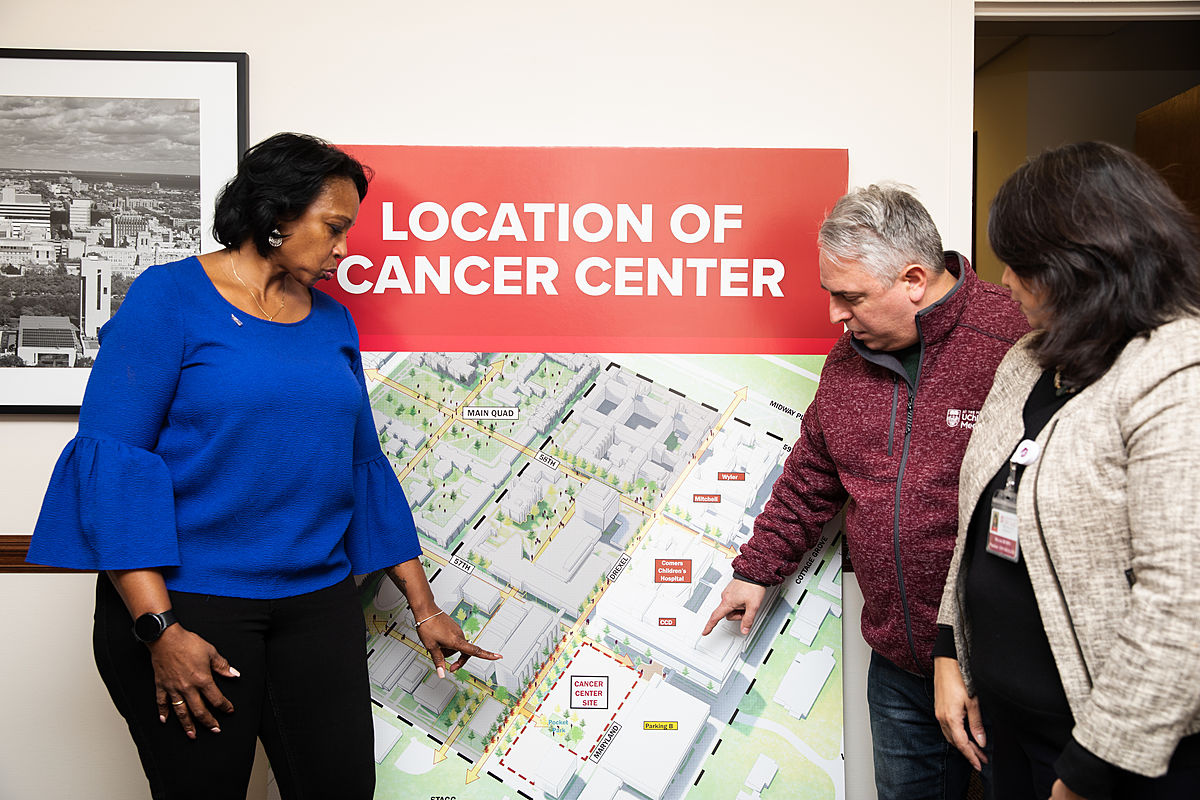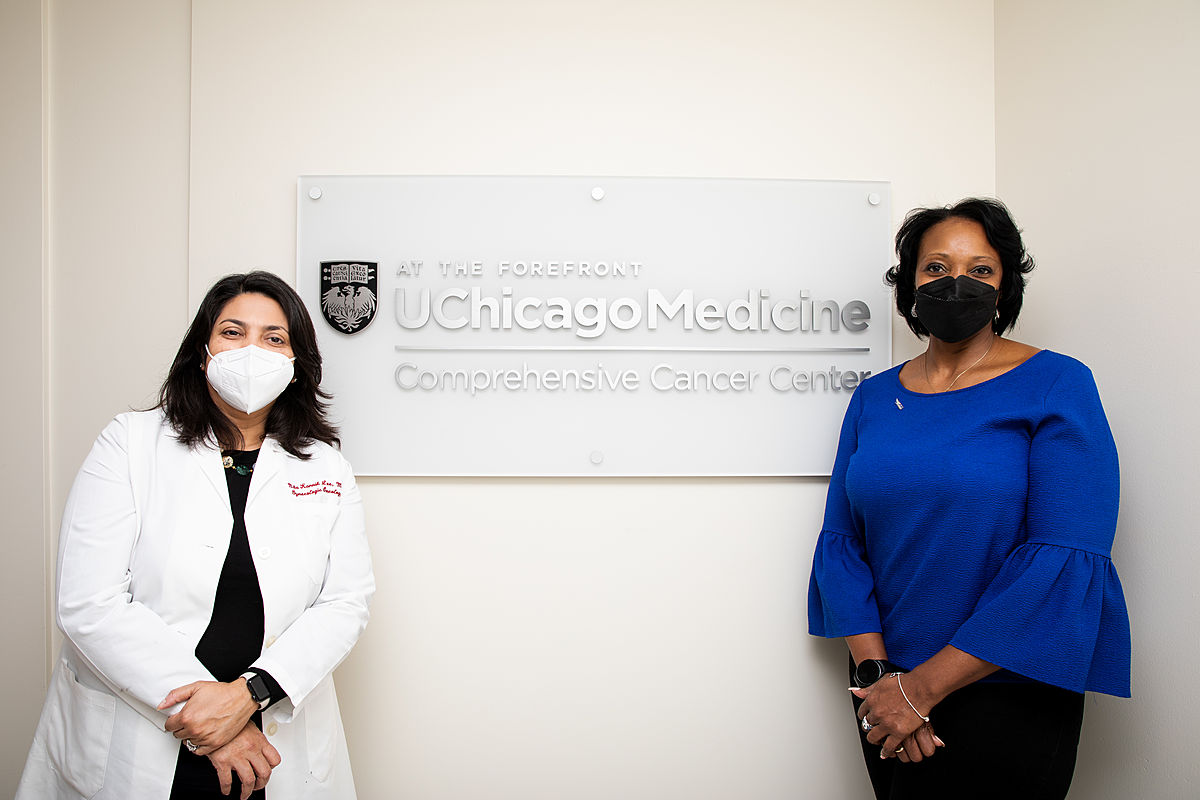On Chicago's South Side, cancer is the second leading cause of death, with cancer death rates nearly twice the national average. Because of a lack of information, resources, and access to care, South Side residents are frequently diagnosed with cancer later and have more issues getting treatment than those who live on the North Side.
Bronzeville resident Candace Henley knows all of that firsthand — and she doesn't want anyone else to go through what she went through. That's why she's helping to shape the creation of the city's first freestanding clinical cancer center, initially as a member, and now as president of UChicago Medicine's Community Advisory Council (CAC).
Easing the way for others on the journey
In 2003, Henley was a thirty-five-year-old single mom of five girls, a full-time CTA bus driver, and a homeowner.
She also had advanced colorectal cancer — but didn't find out until after she'd been ill and misdiagnosed for months.
Even after beginning treatment, she didn't get good information about the inherited disorder that increased her risk. And because she didn't have anywhere to turn for resources during and after her treatment, she lost her home and her job.
Today, as Henley nears the twentieth anniversary of her diagnosis, she's focused on making the road smoother for others.
In 2015, she started the Blue Hat Foundation to provide education, support, and advocacy around colorectal cancer — especially among Chicago's Black residents, who die of colorectal cancer at almost double the rate of white residents.
"You're kind of in a fog when you're trying to navigate cancer: You don't know where to go, you don't know who to talk to. It's such a blessing to be able to use my experience to help make things easier for others, to try to help make the process as easy as possible."
That year, she partnered with UChicago Medicine colorectal cancer prevention and screening specialist Karen Kim, MD, on a campaign encouraging South Side residents to get screened. As that relationship developed, Henley frequently found herself talking about the support that would have helped her during her cancer journey.
As a result, UChicago Medicine invited her to become one of the inaugural members of the CAC in 2016. "I just felt like it was tugging at my heart that my experience and my voice could be utilized in a space that could really make a difference," she said.
A survivor's perspective
The council helps shape the direction of UChicago Medicine's work to serve the community, with a focus on the most pressing issues identified by community residents — including preventing and managing cancer, diabetes, and heart disease.
Henley lends her voice to the CAC in multiple ways. One of the most important to her has been advocating to keep cancer a top priority for UChicago Medicine, especially among other high-profile focus areas such as violence and trauma.
She has also hosted virtual community meetings where South Side residents and UChicago Medicine patients provide input about the new cancer center, which is expected to begin construction in 2023 and open to patients in 2026.
"Different voices bring different lenses" to the discussion, Henley says.

In the meetings, "we talk about plans for the cancer center and explain what it is, what it looks like, even though it's still in a preliminary phase," she says.
"We ask, 'What do you think would be good here? How do you think we can make a difference? How can we make it state-of-the-art and better than anything you've seen before?' It's about making sure people feel listened to and heard and valued."
Henley is also a member of UChicago Medicine’s Office of Community Engagement and Cancer Health Equity advisory board, where she’s worked closely with gynecologic oncologist Nita Lee, MD and her team on helping patients, survivors, caregivers, and advocates in the fight against cancer.

“Our contributions to research projects and ideas makes me feel like we're making a difference for those who have been or will be diagnosed with cancer in the future. As a 20-year survivor it gives the life-changing tragedy of my story a happy ending. I was here, I survived, and I made a difference for others.”
Design for living
Input from community members and council members like Henley is helping to shape the cancer center in a number of ways. For example, their design feedback goes directly to the center's architects, who use it to inform the plans.
"They'll ask, 'so if you were to sit in the lobby, what would you imagine you would want to have, either while you're waiting or a caregiver is waiting?' It's really good to see that they're taking advice from the community for design, not just for services. They come back with ideas and ask for more input."
Thanks to Henley's advocacy, resources that would have been helpful to her, like a food pantry and transportation assistance, are now part of the plans for the center — a decision that will improve health outcomes, she points out.
"Patients are more inclined to make it to appointments and be compliant in their care when they have access to resources, so the convenience of having resources right there at the cancer center is gold."
Henley is also active in the council's working group for preventing and managing chronic disease, which provides UChicago Medicine with input and advice about engaging community members around cancer and diabetes prevention, screening, and treatment.
In addition, she uses her Blue Hat Foundation experience to advise the CAC on designing and distributing grants for community organizations, and she helped create a resource guide for seniors in print and online, a project of which she's especially proud.
"When I was diagnosed, information about resources and support was not something that you could find readily available," she says, "and when you did find it, it was mostly out of date or the services just weren't available anymore.
"But if I'm homeless, if I'm hungry, if I'm jobless, I can't focus on my health. The guide was a really important piece for me — UChicago Medicine recognizing that the community has needs beyond health care."
Henley says serving on the CAC with other people who want to make a positive impact prioritizing the community’s needs is rewarding.
“Having the opportunity to be part of a cohesive group of people who get it and truly want to make change is amazing,” she says. “The community advisory council is proving that the patient voice is actually listened to and respected.”



